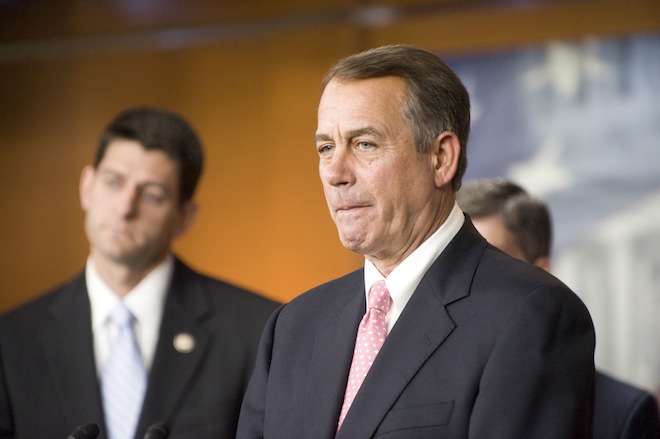The Republican Party has become awfully sanguine about the sequester. That’s not to say that they’re enthusiastic about the fact that it will cut government programs — particularly defense programs — across the board. But after losing back-to-back tax and spending fights — over the fiscal cliff and the debt limit — they’re telegraphing a willingness to let the sequester take an axe to the budget. Or at least that they’re more willing to let it hit than Democrats are.
“We think these sequesters will happen because the Democrats have opposed our efforts to replace those cuts with others-and they’ve offered no alternatives,” said the House GOP’s top budget guy, Rep. Paul Ryan (R-WI), Sunday on NBC’s Meet The Press.
“I’m pretty sure it is going to happen now,” House Armed Services Committee Chairman Buck McKeon (R-CA) told Politico. “I guess the feeling is until everybody feels enough pain, we’re not going to do the things that we really need to do. And that scares me.”
House Speaker John Boehner (R-OH) recently told the Wall Street Journal that the sequester “[is] as much leverage as we’re going to get.”
Until Republicans lost the election, though, these same party leaders were putting on a much different face.
The sequester, Ryan wrote last year, “[will result] in a 10% reduction in Department of Defense programs and an 8% reduction in certain domestic federal government programs, such as the National Institutes of Health and education programs. Intended as a mechanism to force action, the imposition of the sequester would undercut key responsibilities of the federal government.”
Last year, Boehner repeatedly warned that the defense portion of the sequester would “hollow” the military.
The contradictory postures suggest that GOP leaders are fronting for conference conservatives who are restive about their leaders’ failure to force Democrats to accept more cuts to federal spending. It’s also a thinly veiled bluff.
During the fiscal cliff fight, Boehner introduced his failed Plan B, that would’ve allowed tax rates to increase for people making more than $1 million every year. The original version of his plan would have allowed the sequester to take effect. But that invited blowback from defense hawks in his conference, who ultimately secured a provision to roll back the defense cuts for a full year. Unsurprisingly, the plan failed to create consensus within the GOP. Those differences still exist. And they’ll become more clear if the sequester hits, and the defense industry brings pressure to bear on Congress, and particularly on Republicans, to roll it back.










